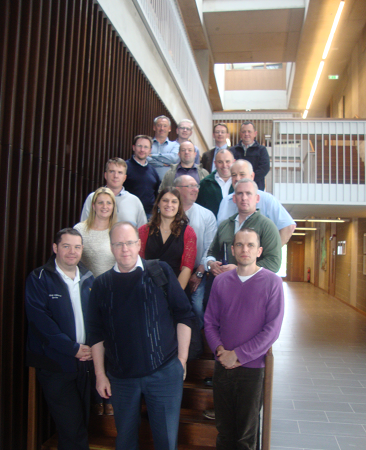Newsletter
Research Workshop
Due to popular demand we will be hosting another Critical Appraisal Workshop on Wednesday 20th November in the University of Limerick. For registration please email bernie.woods@ul.ie or call the CPR office on 061 234615. Full details of the workshop are available on www.ul.ie/cpr
Launch of the Evidence-Based Clinical Practice Guidelines (EBCPG) Project
Evidence-based practise (EBP) refers to the use of current best evidence in making decisions about the care of individual patients. EBP integrates best available external clinical evidence from systematic research with individual clinical expertise. This project aims to collate information on the evidence base and experience base for the PHECC CPGs.

In order to establish a greater evidence base for the CPGs an Expert Group of Emergency Medicine and Prehospital representatives has been convened by CPR to conduct a CPG review and identify key areas requiring further evidence within the current guidelines. Expert Group members include Dr. Cathal O’Donnell (Medical Director, National Ambulance Service),
Mr. David Hennelly (Clinical Development Manager, National Ambulance Service, Mr. Mark Dixon (College Lecturer, Centre for Emergency Medical Science, UCD), Dr. Damien Ryan (CPR Director) and Dr. Niamh Cummins (CPR Research Manager). Advanced Paramedic volunteers have also been recruited and trained by CPR to act as appraisers for the project. The EBCPG appraisers include; Anthony Byrne, Catriona Kinch, Damien Gaumont, David O’Connor, Declan Lonergan, Denis Daly, Des Wade, Gavin Lyle, Paul Cahill, Ray Carney, Ray Lacey, Ricky Ellis and Shane Knox. The inaugural EBCPG Training Day took place on Wednesday September 18th in the Graduate Entry Medical School, University of Limerick. The appraisers have now begun to search the academic literature for evidence in the key areas outlined by the Expert Group and critically appraise relevant research papers identified. A collaboration has also been agreed with the Canadian Prehospital Evidence Based Practice (PEP) database, Dalhousie University for this project.
The next phase of the EBCPG project relates to the establishment of a CPG experience base and is now under development. Plans are in place to host a forum on the CPR website to allow prehospital practitioners to share their individual clinical expertise and establish an experience base for the CPGs.
Publication on the Biomechanics of Extrication
Our award winning research from the National Association of Emergency Medical Services Physicians (NAEMSP) Annual Meeting has now been published online in the Emergency Medicine Journal. The title of the paper is “Biomechanical Analysis of Spinal Immobilisation during Prehospital Extrication: A Proof of Concept Study” by authors Mark Dixon, Joseph O’Halloran and Niamh Cummins.
Website & Social Media
If you haven’t seen our new and improved website yet then please visit us on
www.ul.ie/cpr Our social media is also regularly updated with EMS items of interest so remember to follow us on Twitter @CPR_UL and find us on Facebook at Centre for Prehospital Research UL.
Quarterly Research Update
The following articles were published recently and may be of interest;
Al Amiry et al 2013 Methicillin-Resistant Staphylococcus Aureus nasal colonization prevalence among emergency medical services personnel. Prehospital and Disaster Medicine 28; 4: 348-352.
This study suggests that EMS personnel have a higher prevalence of MRSA colonisation than the general population. This could pose a risk to patients and should be recognised as an occupational hazard for practitioners.
Fogarty & Cummins 2013 The effect of admitted patients in the emergency department on rates of hospital admissions. Emergency Medicine Journal 30; 9: 766-767 (Open Access).
Over the 2-year study period in University Hospital Limerick there was no change in the rate or absolute number of admissions per day compared with the level of inpatient overcrowding.
Mellon et al 2013 Can a media campaign change health service use in a population with stroke symptoms? Examination of the first Irish stroke awareness campaign. Emergency Medicine Journal (Online July 2013).
The first Irish F.A.S.T. campaign had an initial impact on ED attendance of patients with stroke symptoms. However, the campaign effects were not sustained in the long term. Prehospital delay in accessing acute stroke services is a complex process with involvement of factors other than stroke knowledge and intention to call 999.
While these articles are published in reputable peer-reviewed journals in many cases the research presented is in the preliminary stages. It is the responsibility of practitioners to ensure that you only operate within your own scope of practise as defined by the PHECC CPGs.